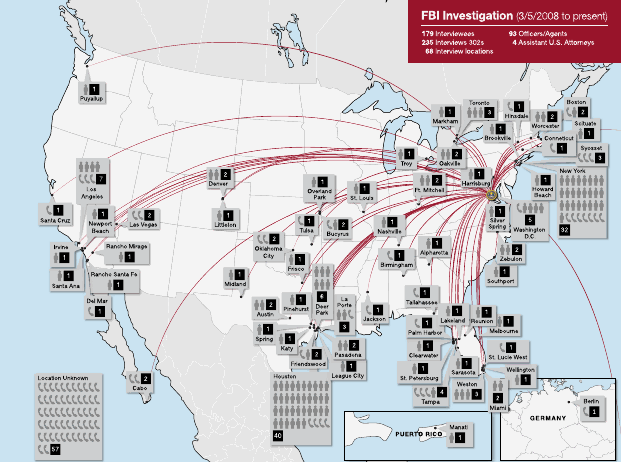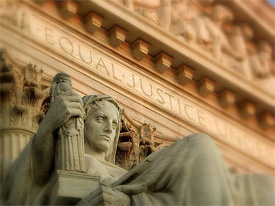DOJ Ethics: PIN Heads, Bloch Heads & The Rocket
 Whoooosh! And, like that, the complete acquittal in USA v. William Roger Clemens came and went. The five year long, over $10 million Clemens prosecution was a joke on the tax paying American public.
Whoooosh! And, like that, the complete acquittal in USA v. William Roger Clemens came and went. The five year long, over $10 million Clemens prosecution was a joke on the tax paying American public.
And so it goes for one defendant accused by the Department of Justice. What about other defendants who have come within the purview of the DOJ for false statements, perjury and obstruction of Congress? Say, for instance, our old friend Scott Bloch.
A friend of mine asked if the following order entered yesterday in Bloch’s case by DC District Court Magistrate Judge Deborah Robinson meant Scott Bloch must report immediately to Jail?
By a petition filed on June 19, 2012, the United States Probation Office advised that Defendant requests permission to travel internationally in August, 2012. U.S. Probation Office Petition (Document No. [74]) at 1. In the petition, the Probation Office notes that on April 27, 2010, Defendant was released by this court pending sentencing, subject to the condition, inter alia, that he report his travel plans to the Probation Office. Id.; see also Release Order (Document No. 5). The release order was entered after Defendant appeared before the undersigned and entered a plea of guilty to a one-count information by which he was charged with criminal contempt of Congress. 04/27/2010 Minute Entry. However, by an order filed on August 2, 2011, Defendant was permitted to withdraw his plea. Memorandum Opinion and Order (Document No. 73) at 1, 13. In the interim, no other charge has been filed, and no further proceedings have been scheduled; accordingly, Defendant is not on release pending sentencing, and has not been since August 2, 2011, the date on which he was permitted to withdraw his plea. It is, therefore, ORDERED that the release order (Document No. 5) is hereby VACATED nunc pro tunc to August 2, 2011. (lcdar3)
No, my friend was joking; but, still, the laugh is superbly taken. Looks to me like Bloch is scott free (some pun intended) OR (Own Recognizance) pending any other charges. Where are the new charges and/or plea?
When, if ever, will the DOJ Public Integrity Section (PIN) get around to pursuing the blatant in your face, egregious, actual crime against Congress committed by a critical federal investigative and prosecutorial attorney appointed to protect federal employees and whistleblowers instead of the silly corporate and in-bred Congressional protection racket charges inherent in the Roger Clemens, Barry Bonds and John Edwards prosecutions?
Okay, if I was Bloch’s defense attorney, William Sullivan of Pillsbury, I would absolutely say this is bunk, put my client on OR or cut him loose considering the dilly dallying, thumbs in ass, conduct of the DOJ. Since I am not him, I would like to know what the heck is going on. It has been nearly a year since Royce Lamberth, somewhat surprisingly, allowed Bloch to withdraw from his plea.
In their collusive attempt to get Bloch’s plea withdrawn, the DOJ and Bloch avowed they had already been discussing alternative paths for either charging or plea. That was before Lamberth allowed the withdrawal, i.e. well over a year ago. What in the world is stopping the DOJ from prosecuting this Criminal? In that same time period, they tried Roger Clemens twice, the second one lasting over two months, but apparently they just can’t find the time to prosecute a real criminal like Scott Bloch, doing real damage to government and Congress
Here is the thing, the date of the “Geek Squad wipe” Bloch obstructively did to his government computers was 12/18/2006 – the statute has now presumptively run on that. House Oversight requested their depo/interview on 12/6/2007 and actually took it on 3/4/2008. So, probably, there are still offenses within the SOL but it is wasting away. This just is NOT that complicated of a gig IF you are not completely pulling punches.
Seriously, please, tell me why we are still hanging where we are? A misdemeanor level rookie municipal prosecutor could have convicted Bloch in about a day and a half, maybe two day, long trial. The crack team at DOJ lead by the heads of PIN just can’t get er done? Scott Bloch should be heading to prison, not off on an Independence Day holiday vacation.
The real question here is not when will Bloch be dealt with, but why has he not been standardly, and appropriately – yet – still, even as of this quite late date within the statute of limitations? This course of conduct by the DOJ of colluding with Bloch to have him avoid accountability is a mocking joke on both the Article I Congress and the Article III Court. Yet, no questions are asked, no explanations given by DOJ, and few, if any, answers demanded by the press or Congress. The Obama DOJ, from their first moment, unequivocally, and inexplicably, aligned and sided with the criminal defendant Bloch, and diametrically opposite the interest of the public and rule of law.
Why do you think that is? Take a look at this in contrast to the way Roger Clemens was treated by the United States Department of Justice. And the way the Banksters have NOT been treated to the “niceties” of the US Criminal Justice system.
Golly, I wonder why that is? If Barack Obama and Eric Holder’s DOJ cannot answer for the lack of viable Wall Street/Financial Products Industry prosecutions, and have such little to say after the catastrophically worthless persecution of Roger Clemens, maybe the DOJ could at least tell the people it represents what the hell it is doing with Mr. Scott Bloch.
Naw, that is probably just too much to ask from America’s finest.





